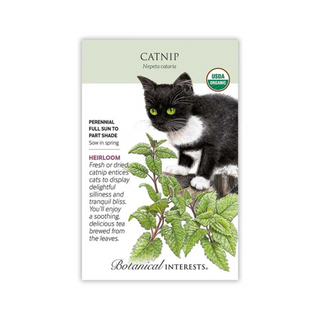
Description
Catnip is a multi-purpose plant. The tea is very pleasant with a lemon-mint flavor and fragrance. Along with fresh catnip planted in containers indoors year-round, catnip toys filled with dried leaves will provide your feline friends with hours of fun. But be warned; they may ignore you for a while! Catnip is very hardy and grows in almost any soil; self-sows readily.
Variety Info
- Family: Lamiaceae
- Native: Eurasia
- Hardiness: Hardy perennial in USDA zones 3 and warmer
- Exposure: Full sun to part shade
- Plant Dimensions: 3' tall and wide
- Variety Info: Pale green, soft leaves that emit a characteristic, pungent, minty odor when crushed. Small white or lavender tubular flowers massed at the ends of stems in early to midsummer with scattered blooming through early fall.
- Attributes: Deer Resistant, Drought Tolerant, Good for Containers
Sowing Info
- When to Sow Outside: 2 to 4 weeks before your average last frost date. Sow as late as 2 months before your average first fall frost date. Optimal soil temperature for germination is 60°–70°F.
- When to Start Inside: 6 to 8 weeks before your average last frost date.
- Days to Emerge: 10–15 days
- Seed Depth: ⅛"–¼'
- Seed Spacing: A group of 3 seeds every 12"
- Row Spacing: 36"
- Thinning: When 2" tall, thin to 1 every 12"
Growing Info
- Harvesting: Cut stems about 4" from the ground. Tie branches with string or rubber bands, and hang upside down in a brown paper bag, in a cat-free, dry location until leaves crumble easily. Keep dried flowers and leaves, discard the stems. Store in an airtight container in a cool, dry location.
Description
Catnip is a multi-purpose plant. The tea is very pleasant with a lemon-mint flavor and fragrance. Along with fresh catnip planted in containers indoors year-round, catnip toys filled with dried leaves will provide your feline friends with hours of fun. But be warned; they may ignore you for a while! Catnip is very hardy and grows in almost any soil; self-sows readily.
Variety Info
- Family: Lamiaceae
- Native: Eurasia
- Hardiness: Hardy perennial in USDA zones 3 and warmer
- Exposure: Full sun to part shade
- Plant Dimensions: 3' tall and wide
- Variety Info: Pale green, soft leaves that emit a characteristic, pungent, minty odor when crushed. Small white or lavender tubular flowers massed at the ends of stems in early to midsummer with scattered blooming through early fall.
- Attributes: Deer Resistant, Drought Tolerant, Good for Containers
Sowing Info
- When to Sow Outside: 2 to 4 weeks before your average last frost date. Sow as late as 2 months before your average first fall frost date. Optimal soil temperature for germination is 60°–70°F.
- When to Start Inside: 6 to 8 weeks before your average last frost date.
- Days to Emerge: 10–15 days
- Seed Depth: ⅛"–¼'
- Seed Spacing: A group of 3 seeds every 12"
- Row Spacing: 36"
- Thinning: When 2" tall, thin to 1 every 12"
Growing Info
- Harvesting: Cut stems about 4" from the ground. Tie branches with string or rubber bands, and hang upside down in a brown paper bag, in a cat-free, dry location until leaves crumble easily. Keep dried flowers and leaves, discard the stems. Store in an airtight container in a cool, dry location.

